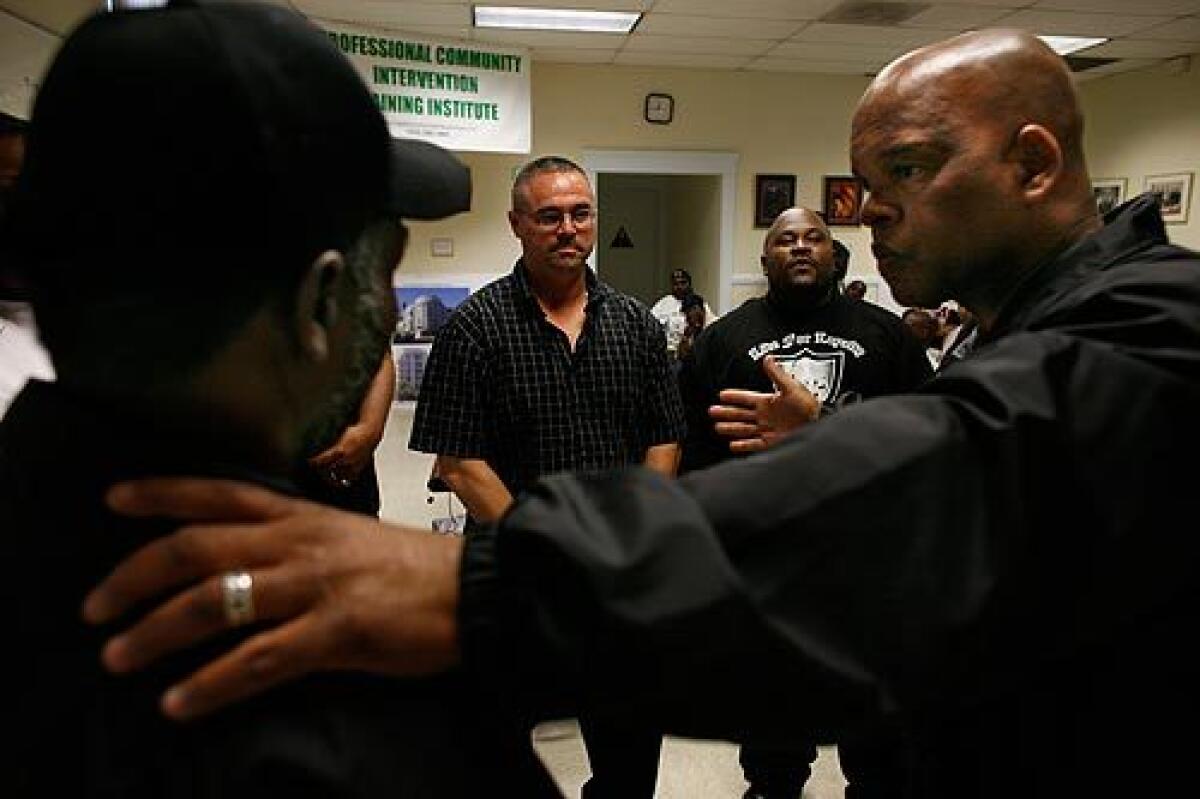A different sort of academy

Multimedia >>>
- Share via
There was a logjam at the door of a makeshift schoolhouse one recent morning, because everyone was being scanned with a metal detector. There was a reason for that.
Of the 50 students filing in for class, 45 were once gang members -- in at least 30 rival gangs. It was a swaggering crowd, with shaved heads and baggy pants, gold chains draped around thick necks. Many still used their street names: Brick. Q Ball.
The students sat on metal folding chairs. They referred to each other as “soldier,” and the broad-shouldered man they called “commander,” Aquil Basheer, strolled the room handing back graded tests. The students glanced at their tests, then tucked the papers into notebooks. Most had done pretty well, acing questions like No. 6: “A person has a firearm pointed at your head. What should you do?” (One student’s correct answer: “Grab shooter’s arm push away from head.”)
If the city of Los Angeles is going to create a professionalized field out of gang intervention, it is going to need training academies -- schools. Just don’t expect those schools to look like any other.
The city’s campaign has produced two of them so far. This -- the Professional Community Intervention Training Institute, which just graduated its second class out of a refurbished fire station in South Los Angeles -- is one.
Basheer is the institute’s director, a fire inspector by trade and an interventionist himself for decades, and a gang member before that. He calls himself a “violence elimination professional,” which entails everything from gang mediations to teaching paramedics what to do if they arrive at a gang-related shooting before the police. This class, free to students and watched closely by law enforcement and City Hall officials, is his latest undertaking.
“This is not a game,” Basheer said as he handed out tests, delivering his usual dose of stern, forbidding wisdom. “History is being made every day. You’ve got to have credibility.”
Basheer, 54, offers lessons that are part self-help sessions and part stark morsels of street knowledge.
Students learn CPR -- and how to stage a candlelight vigil without exposing mourners to gunfire. They learn how to extricate someone from an angry crowd.
Looking to stir up old tension -- and then dissipate it -- Basheer intentionally accepts a mix of students from rival gangs. Exercises can end in tears. At one class, Basheer staged a community meeting. Four students played interventionists, while six played residents of a rough neighborhood -- assigned to berate the interventionists, telling them that they could never be reformed or fix the damage they’d done.
Robbie Warren, 39, a former Hoover gang member who served two prison terms for robbery, was weeping by the end. “I could really feel it,” she said. Warren said she genuinely wanted to repair the damage she’d done -- but also knew she’d have to face skeptics.
“This has been an eye-opener,” said another student, Keith “Kalikoat” McComb, 43. McComb has been in a wheelchair since 1985, when he was shot in the back. “I lost too many,” he said quietly. “That’s why I’m here.”
Basheer has written a “Manual of Operation” -- the first standard operating procedures, in some respects, for a newly professionalized field. It cuts to the chase, offering a series of “situational exercises.”
In one, an interventionist is summoned to referee a standoff between rival gangs in a parking lot: “You feel beads of sweat form on your forehead. Help is nowhere to be found, and your normal comfort zone has been breached.”
It also includes behavioral standards: Don’t gossip. Dress professionally. And: “We will not participate in vices which we are attempting to cure.”
Much of the instruction is designed to prop up the untested, fragile relationship between interventionists and police. Students learn about crime scene protocol -- and are taught, for instance, to never touch an officer in the field.
“It’s a very tender relationship,” Basheer said. “You still have a whole lot of apprehension on both sides.”
More to Read
Sign up for Essential California
The most important California stories and recommendations in your inbox every morning.
You may occasionally receive promotional content from the Los Angeles Times.











